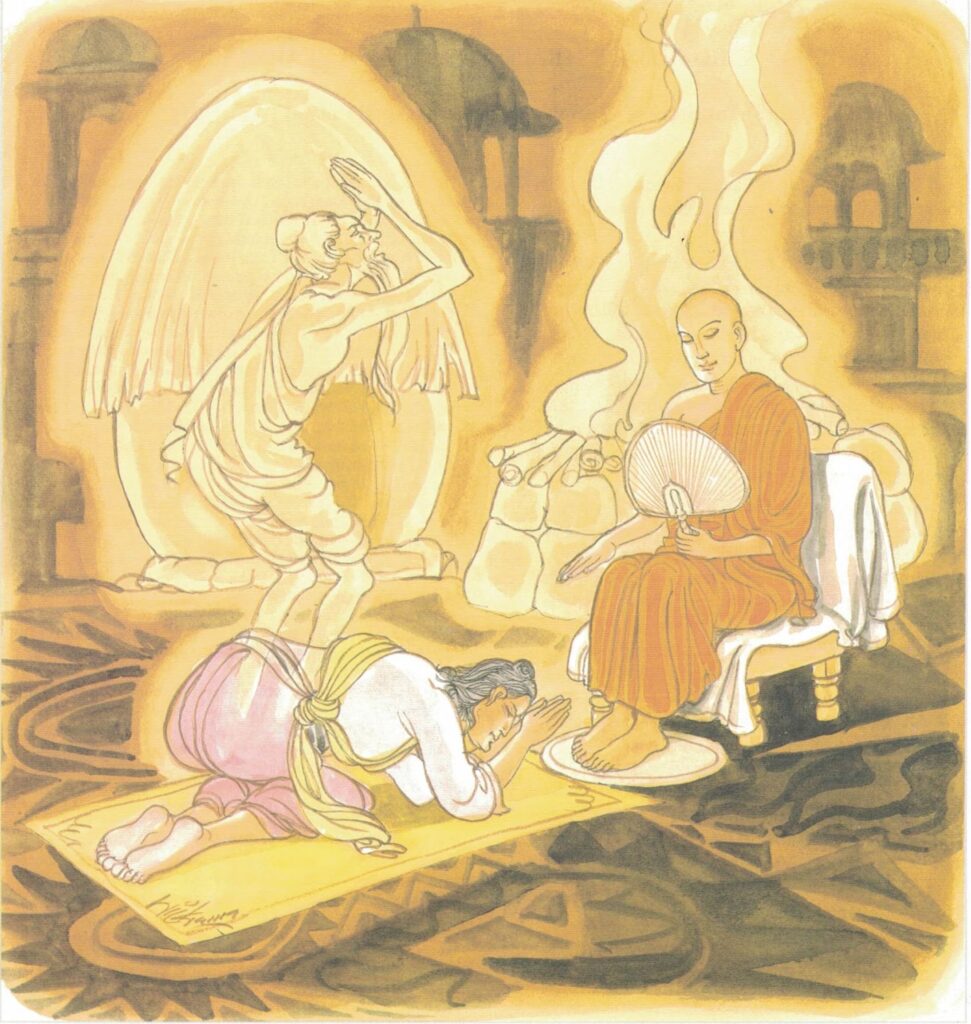Pali text, illustration and English translation of Dhammapada verse 392:
yamhā dhammaṃ vijāneyya sammāsambuddhadesitaṃ |
sakkaccaṃ taṃ namasseyya aggihuttaṃ’va brāhmaṇo || 392 ||
392. From whom one knows the Dhamma by Perfect Buddha taught devoutly one should honour them as brahmin sacred fire.

The Story of Venerable Sāriputta
While residing at the Jetavana Monastery, the Buddha spoke this verse with reference to Venerable Sāriputta.
This Venerable, we are told, first heard the Dhamma from the lips of Venerable Assajī; and from the day when he attained the fruit of conversion, in whatever quarter he heard that Venerable Assajī was residing, in that direction he would extend his clasped hands in an attitude of reverent supplication, in that direction he would turn his head when he lay down to sleep. The monks said to each other, “Venerable Sāriputta holds false views; on this very day he is going about doing reverence to the cardinal points,” and reported the matter to the Buddha.
The Buddha caused the elder to be summoned before him and asked him, “Sāriputta, is the report true that you are going about doing reverence to the cardinal points?” “Venerable, you know me, and you know of yourself whether or not I am going about doing reverence to the cardinal points.” Then said the Buddha, “Monks, Sāriputta is not doing reverence to the cardinal points. The fact is that he first heard the Dhamma from the lips of Venerable Assajī, and that from the day when he attained the fruit of conversion, he has reverenced his own teacher. For a monk should reverence the teacher through whom he has learned the Dhamma with the same degree of reverence with which a brāhmin reverences the sacred fire.”
Explanatory Translation (Verse 392)
yamhā sammāsambuddha desitaṃ dhammaṃ vijāneyya
aggihuttaṃ brāhmaṇo iva taṃ sakkaccaṃ namasseyya
yamhā: from someone; sammāsambuddha desitaṃ dhammaṃ [dhamma]: Dhamma preached by the Enlightened One; vijāneyya: is learnt; aggihuttaṃ brāhmaṇo iva: like the brāhmin the sacrificial fire; sakkaccaṃ [sakkacca]: meticulously; duly; namasseyya: (him) salutes
If a seeker after truth were to learn the Word of the Enlightened One from a teacher, that pupil must pay the Teacher due respect, like a brāhmin paying homage assiduously and with respect to the sacrificial fire.
Commentary and exegetical material (Verse 392)
Venerable Assajī: This stanza was occasioned by Venerable Sāriputta’s adoration of Venerable Assajī, who was the last but by no means the least, of the five monks who formed the vanguard of the noble Sangha.
His life followed closely the pattern of the other four monks. These five were enamoured of the ideal just as their five counterparts showed the way during the dispensation of Padumuttara Buddha. History or prehistory was repeating itself. He had the unique distinction of being the first arahat to show the way to Upatissa the brāhmin afterwards to become the chief disciple as Venerable Sāriputta. He quoted the stanza which became the world famous in the Buddhist world. The stanza afterwards became known as the Assajī stanza. At first Assajī tried to put Upatissa off on the plea that he was a novice. But Upatissa insisted on hearing the gist of the Dhamma whether it was long or short. As has been engraved in thousands of Buddhist votive shrines in India he said “Of all things that proceed from a cause, the Buddha has told–And also how they cease to be this too, the Buddha did unfold.” In other words the Second and third Truths in the first sermon of the Buddha were revealed. It simply means that the Buddha not only showed how a being came into existence but also how that existence could cease forever. If there is a craving there must be a ceasing thereof. To Upatissa it was like opening a door to a familiar room. Before the second line was quoted the truth flashed before his vision and he entered the stream of saintship. Soon, Upatissa became the chief disciple. His was a rare intellect only second to the Buddha’s.
It was said that actuated by the noble quality of gratitude ever afterwards the chief disciple slept wherever possible with his head turned towards the direction of the place where Venerable Assajī, his teacher, was said to be sojourning. The deportment of Assajī while going on rounds for food was so striking that it moved a great being like Upatissa to go closer to him.
He was of the five the last,
But to point the way the first.
To Upatissa the Lord’s chief,
Dhamma’s commander in chief